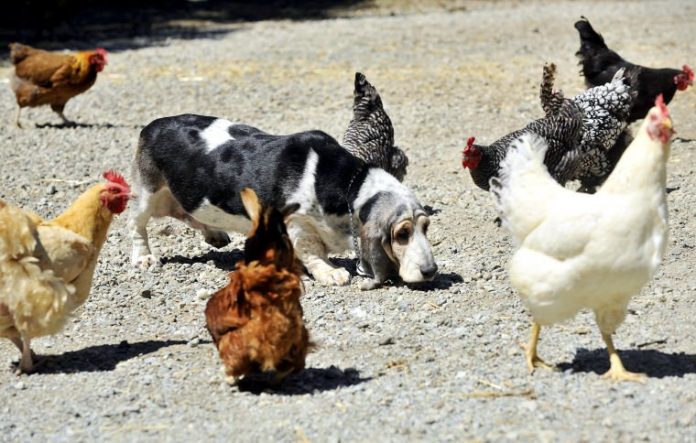
More than 100 people from Santa Clara to Santa Cruz flocked to Morgan Hill and Gilroy on May 18th to learn all about backyard chicken keeping from folks who know a thing or two about caring for clucking companions.
It was all part of the Coop d’Hill Tour, organized and hosted by local hobby farmers eager to share their knowledge and experience with their tour guests.
Nine tour stops presented visitors with a range of possibilities for chicken keeping. Everything from a simple backyard coop with three hens to larger operations including a ranch focused on breeding heirloom chickens, and another farm where chickens live side by side with peacocks, emus, a llama and several alpacas.
At each stop, visitors were given a pair of paper booties to pull over their shoes before visiting with the chickens, to help prevent the spread of unwanted microorganisms that might be harmful to the flock. They got a first-hand look at chickens of varying breeds, with a quick lesson on what physical signs to look for in a healthy hen. Some were surprised to see that in nature, chicken eggs range in color from white to pale blue, tan and chocolate brown, depending on the breed.
There was no such thing as a stupid question on this tour, where hosts were generous with information and resources for learning about chicken breeds, feeding requirements, sustainable farming practices and more. The tour also provided an opportunity to explore different hobby farm layouts as well as backyard coop designs and feeding/watering systems.
Many newcomers on the tour wondered how best to get started – with the chicken, or the egg?
According to one tour host, Lisa Ruminski of Morgan Hill, “It’s often easier for beginners to start with birds that are already ‘feathered out’ rather than with chicks or with an incubator full of eggs.”
3 Dog Farm
14999 Osbourne Ct
Lisa and Ed Ruminski
Li***********@***il.com
(831) 601-6471
Lisa and Ed Ruminski own 3 Dog Farm, named for their three Basset Hounds, which provide companionship and help protect the chickens from natural predators such as coyotes and foxes. The Ruminski’s have more than 100 birds, half of which are laying hens and half are juveniles that will begin laying at the end of this summer. Their flock includes 20 different breeds from Aracaunas to Welsummers.
“The Top Hat Polish Hens are a nod to Ed’s homeland,” explains Lisa. “The best laying hen is the Black Copper Marans, which produces eggs the color of dark chocolate. The taste and nutrition value of eggs from pasture chickens is far better than supermarket eggs. Chickens are omnivores. They like to eat bugs, snails and lizards as well as grass. And they thrive on sunlight.”
Ed Ruminski’s hobby is carpentry. He builds custom chicken coops and he invented a chicken feeder that the couple now sells on their website and on craigslist. Before buying, Ed had studied various organic feeders on the market but found they created waste. His feeder eliminates waste and makes the task of filling the feeders less onerous.
The way Lisa sees it, “Morgan Hill is a great place to have animals. Among the people I’ve connected with, chicken keepers don’t have a mean bone in their bodies. I hope we remain a community of people who love nature, and keep the small town feel.”
Ruminski estimates that general maintenance of their chickens takes about half an hour in the morning and about 15 minutes in the evening. They gather eggs at midday. Weekly cleaning is a priority to prevent disease.
While roosters are not permitted within the city limits because of their crowing, a rooster is not required for hens to produce eggs. Four hens can typically provide enough eggs for a family of four. A healthy hen begins laying at about five to six months old, and lays for three years or more, with each chicken averaging about four eggs per week.
Shady Creek Farm
14990 Watsonville Rd
Dave and Liza Garibaldi
(408) 390-0224
sh************@***il.com
Liza and Dave Garibaldi tend to their 75 chickens, two sheep, two dogs and two cats on their 6-acre spread, Shady Creek Farm, which was established by Liza’s father in 1974. Dave handles day-to-day farm management while Liza works as a paralegal. During her spare time, Liza enjoys creating and conducting educational workshops for backyard chicken keeping and related topics.
According to Liza, “it was through the Creekside Co-op, a small community of hobby farmers, that Dave and I became friends with our neighbors because of our shared interest in raising backyard chickens and other sustainable farming practices. We’ve had the opportunity to help others set up their chicken coops and get started, and this spring we’ve sold about 50 chicks to new owners.”
Liza also formed an online meet-up group called Chicken Chat, (http://www.meetup.com/ChickenChat) where people can check the calendar for upcoming classes on basic chicken keeping, gardening, worm composting, beginning carpentry skills, canning and preserves, and raising Heritage Chickens.
The Garibaldi’s are working with the Farm Bureau to learn what Creekside Co-op members are able to sell at local farm stands.
Gallo Farm
Susan and Nino Gallo
14790 Mosegard Lane
(408) 605-5849
su********@*sn.com
Susan and Nino Gallo are breeding, hatching and raising Mottled Java chickens. One of the oldest American chicken breeds, the Mottled Java is considered an endangered breed today. As participants in the Sustainable Poultry Network (SPN), the Gallo’s are selecting and breeding to standards set by the American Poultry Association.
“The Sustainable Poultry Network aims to bring historical, heirloom breeds of poultry back to the kitchen tables of American families,” said Susan Gallo. “To do so requires carefully establishing breeding flocks. With this in mind, the SPN connects breeders of standard poultry with mentoring, education, inspection and certification services, and recommends these breeders for consumers looking to purchase farm fresh products.”
This fall, Gallo Farm is expected to become one of only a handful of certified breeders of heritage chickens in the state of California.
Gallo encourages all who are interested in this approach to backyard chicken keeping to consider the upcoming Workshop Seminar which will be held at Morgan Hill’s Machado School, October 7-9, 2013. The event will feature Jim Adkins, an SPN representative. Event topics will include a backyard basic poultry meeting, a certification coaching seminar and a variety of information on breeding Heritage chickens. One session on cooking and marketing of heritage poultry will be led by Steve Pope, National Heritage Chef.
Dee and Tee’s Hobby Ranch
11290 Schofield Court, Gilroy
Dee and Terry Sanders moved to Gilroy from Los Gatos several years ago because they wanted more land on which to raise chickens and grow vegetables. According to the Sanders, they read “Raising Chickens for Dummies” and researched online before getting started on what they now call Dee & Tee’s Hobby Ranch. They began with a few chickens, and then bought a llama and a few alpacas, which they learned will help protect chickens from predators.
“We added two peacocks with the hope that they will become a breeding pair,” Dee Sanders says with a smile, “but so far the female hasn’t shown any interest. Our animals also provide us with excellent natural fertilizer for our vegetable garden.”
According to Terry Sanders, “recently, we went to a local farm auction to buy a few goats but instead we came home with a pair of emus. It’s a longterm investment since emus can live to 35 years old.”
Fortunately for Sanders, “emus are good-natured because they weigh about 100 pounds and reach 5 to 6 feet by the time they’re about 1 to 2 years old. The female struts around making a noise that sounds like a soft drum beat. She does this when she’s feeling protective of her territory.”
While the Sanders’ female emu has laid a clutch of eggs, it is the male that made the nest and gathered the eggs, and he’ll be sitting on them for about 50 to 60 days until they hatch. Anyone for an emu omelet?
By day, Terry works as an air traffic controller at the Oakland Air Route Traffic Control Center (ARTCC) in Fremont, one of the nation’s busiest such centers.
“When I get home, the last thing I want to do is sit in front of an electronic screen,” she said. “I just want to get outside and spend time with our animals. We hope that more people give hobby farming a try, especially if they have kids. It’s a great experience to grow up with.”
****
The success of their first tour has encouraged Coup d’Hill organizers to make it an annual event. Donations received at Coop d’Hill Tour stops went to Heifer International, a global nonprofit dedicated to ending poverty and hunger in a sustainable fashion. Heifer will use the funds to provide eight families with flocks of 12 chicks each that they can raise, breed, and rely on as a sustainable source of food and income.
https://sites.google.com/site/coopdhill/coop-information
www.sustainablepoultrynetwork.com
www.backyardchickens.com
www.heifer.org













